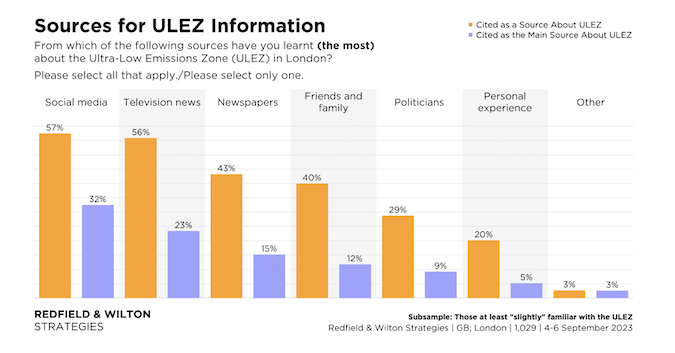Rishi Sunak’s decision to water down a number of the government’s green policies is further evidence of the extraordinary importance the Conservatives have attached to the knife-edge outcome of the Uxbridge & South Ruislip by-election in July.
Most evidence suggested Labour would gain the seat abandoned by Boris Johnson but, as Lewis Baston showed in his preview for On London, that was never going to be easy in a stubbornly Tory area. And in the event, the Conservative candidate clung on by the tiny margin of 495 votes. It was just enough in the face of a large swing against his party, which saw its majority cut from 7,210, and hardly a ringing endorsement of Sunak’s government.
Yet this skin-of-the-teeth escape in one part of the London suburbs has formed the basis for a huge switch in national government policy and Tory general election strategy, and for a new caution in Labour’s national approach, beginning with Keir Starmer publicly distancing himself from Sadiq Khan for expanding the Ultra-Low Emission Zone to cover the whole of the capital.
The policy was held to have deprived Labour of victory in Uxbridge, and probably correctly so. After all, the Tory candidate, Steve Tuckwell, ran a single-issue campaign opposing the expansion. Encouraged, Susan Hall, Khan’s Tory opponent for next May’s mayoral election, has continued to strongly oppose the expansion, which took place on 29 August.
Clearly, at national level both major political parties believe the Uxbridge result proved that clean air and other environmental policies can be significant vote-losers and have behaved accordingly. But how much significance should really be attributed to Tuckwell’s narrow win?
Earlier this month, just as its latest expansion came into effect amid huge controversy, pollsters Redfield & Wilton sought Londoners’ opinions about the ULEZ as a whole. They found more of us supported than opposed it by the solid margin of 44 per cent to 33. However, that was considerably less than the net support of 34 points the same pollsters found in June. Does that mean opposition to the ULEZ is on the rise and will keep on rising, vindicating Sunak, Starmer and Hall alike?
Maybe not. The same poll also asked outer Londoners – as distinct from Londoners as a whole – who own a motor vehicle if they believed they would have to pay the daily ULEZ charge. Of those, even with the scheme already live, 36 per cent believed they would. Yet vehicle registration figures from last year – figures which, by the way, Hall has said she has confidence in – indicate that a far smaller proportion will fail to comply with ULEZ standards. Could it be that many voters’ anxiety about the ULEZ has long been misplaced?
Redfield & Wilton also asked where Londoners had got their information about the ULEZ from. The source selected by the largest number as their primary one was social media, named by 32 per cent. By contrast, only five per cent said it was mostly from personal experience. Although Mayor Khan has been making his pro-ULEZ case through social media channels, X (formerly Twitter), Facebook and so on have been seething with anti-ULEZ rage and untruths (the Mayor has cited research suggesting that large numbers of X accounts attacking the ULEZ were inauthentic, created simply to spread opposition).

The Conservatives’ Uxbridge campaign itself relied on exaggeration, distortion and what some would call sharp practice to create an impression that the ULEZ expansion would hit far more people in the constituency that it was ever going to. Leaflets described it as a “tax on drivers”, a form of words that could be taken as referring to all drivers in London, not just a small minority who will be directly affected by having to pay the charge (probably fewer than one in ten). Literature produced by the Tories masqueraded as community publications (see photo) unattached to any political party and speaking for local people as a whole.
It was, in short, a disingenuous, scare story campaign which, in a resiliently Tory area wooed by what some feel was a sub-par Labour performance – weakened rather than reinforced by its candidate, Danny Beales, changing his stance on the ULEZ – mobilised just enough Tory support to stave off the Labour challenge. Looked at in such a way, the Uxbridge result might be seen more as an oddity in a very particular set of local circumstances than as a solid foundation for an entire national electoral re-think.
That isn’t to say a narrative opposing a so-called “war on motorists”, fervently backed by Tory-leaning media organisations, won’t have any purchase across the country. Perhaps it will make a decisive difference in the very types of seat the Tories most desperately need to hang on to at the general election, including Uxbridge and others in outer London. It isn’t to say, either, that Susan Hall won’t derive any benefit from continuing to promise to do away with the latest expansion if elected.
The next polls about the ULEZ, as the expansion settles in, could be very revealing in that regard. Will Uxbridge look more and more like the bellwether event an assortment of very senior politicians have treated it as, or will there turn out to be less mileage in it they they all thought?
from onlondon.com
How much electoral mileage is there in opposing the ULEZ?

